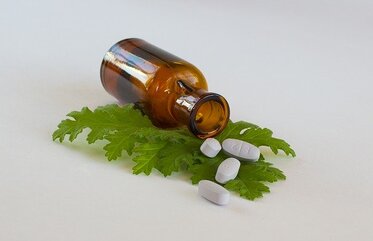DRUG-HERB AND DRUG-SUPPLEMENT INTERACTIONSROLE OF DIETARY SUPPLEMENTS IN MODERN LIFE Many people today take dietary supplements, herbal remedies, botanicals, and other “natural products” as part of their daily wellness regimen. Dietary supplements come in the form of pills, powders, or liquids and are widely available. Note that in the United States, herbs and herbal remedies are regulated as dietary supplements. DO SUPPLEMENTS PREVENT OR TREAT DISEASE? While there is a lot of evidence that dietary supplements help to prevent and treat nutrient deficiency, there is less evidence about the usefulness of dietary supplements in preventing or treating disease. In an evidence-based study of the links between nutritional supplements and mood and neurological disorders, antioxidants, omega-3 fatty acids, quercetin, folate, and zinc demonstrated benefit for depression. Elsewhere, research indicates that pomegranate may ward off infection, turmeric has been studied for Alzheimer disease, rheumatoid arthritis, and prostate and colon cancer, and ginger has proven effective for nausea and vomiting. DOES MY SUPPLEMENT OR HERB INTERACT WITH MY PRESCRIPTION DRUG? Although herbs and herbal remedies are regulated as dietary supplements and not as drugs, prescription drugs and herbs may interact in harmful ways. Some supplements decrease the effects of a drug. Others may increase a drug’s effects and produce unwanted side effects. Significantly, there is extensive evidence that St. John's wort interacts in dangerous, sometimes life-threatening ways, with a variety of prescription drugs including birth control pills, antidepressants, and some HIV drugs. There is still a lot we don’t know. TELL YOUR HEALTHCARE PROVIDER It’s important to tell your healthcare provider about all dietary supplements and drugs you take so they can help you avoid harmful interactions. WHERE DO I LEARN MORE? WEBSITES National Center for Complementary and Integrative Health https://nccih.nih.gov/health/herbsataglance.htm Fact sheets on specific herbs or botanicals MedlinePlus of the U.S. National Library of Medicine https://medlineplus.gov/druginformation.html Drugs, Herbs and Supplements page BOOKS Tarascon Pocket Pharmacopoeia 2020 Richard J. Hamilton, M.D., Editor-in-Chief. Ten pages detailing possible drug interactions with commonly used herbs. Herbal Contraindications and Drug Interactions 2010 Frances Brinker, N.D. Comprehensive guide to drug-herb interactions with additional extensive appendices addressing common conditions, medications and nutritional supplements, and influences on phase I, II, and III metabolism. Disclaimer: Information in this blog is presented for educational purposes only. Not intended to diagnose, treat, cure, or prevent any disease. The use of herbal preparations is not recommended without seeking the advice of a healthcare provider. Substances in herbal preparations may interact with prescription drugs to eliminate therapeutic efficacy or induce toxicity.
0 Comments
Your comment will be posted after it is approved.
Leave a Reply. |
�
AuthorKerilyn Sappington is the founder of Integrative Translations, which specializes in the Chinese to English translation of topics in conventional and complementary medicine. Archives
June 2024
Tags
All
|


